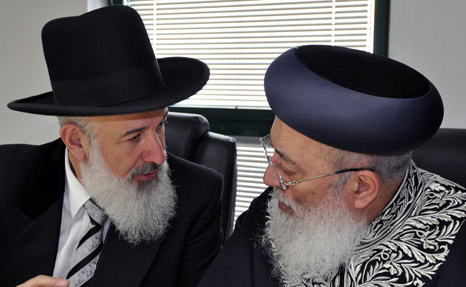The Chief Rabbinate: A Religious Version of the State President
Israel's chief rabbis traditionally serve as representatives of Judaism at state functions, manage Israel's religious services, and render religious rulings for the State. In an op-ed in Maariv, Yair Sheleg argues that since the chief rabbinate has failed in its performance of the latter two functions, it should serve solely in its representative capacity.

The travesty of the elections for the Israeli chief rabbinate—which will be ending, thank God, this week—is yet another step in the decline of this institution. What could possibly have been missing? There was a candidate who was deemed to be "Reform" by his opponents, who threatened to excommunicate him, while he himself took pains to emphasize that he does not intend to change one iota of Jewish law. Religious Zionist rabbis banded together with the ultra-Orthodox to work against another religious Zionist rabbi. A world war broke out between the sons of Rabbi Ovadia Yosef over the right to be their father's candidate. An incendiary rabbi worthy of being ousted from his position as a municipal rabbi set his sights on becoming chief rabbi of the entire State of Israel instead. Deals were made between Shas and Habayit Hayehudi, with each side planning to break the deal while concealing its responsibility. Personal legislation was submitted to the Knesset with the clear intent of promoting one or the other of the candidates. And last but not least—although not directly related to the elections—an incumbent Chief Rabbi was forced to recuse himself due to criminal allegations levied against him.
All this makes it clear that the institution of the chief rabbinate no longer has a right to exist in its current form. Rather than bringing honor to the Torah of Israel, the chief rabbinate has become just another political institution, with all the evils of such institutions. Secular Jews try to bypass it (e.g., by getting married in Cyprus), the ultra-Orthodox despise it, and each branch of religious Zionism, which may hold the institution in some esteem, has rabbis of its own. As it stands now, the main value of the chief rabbinate is in the jobs that it provides.
Traditionally, the chief rabbinate has three functions. It has a representative function, in which the chief rabbis confer an aura of tradition and religion to ceremonies and official state events. It has a practical function, in which the chief rabbis manage the religious services of the state (e.g., marriages, kosher food supervision, etc.). And it has a halakhic function, in which the chief rabbis issue religious rulings on questions that affect the entire country (e.g., conversion and shemittah, the sabbatical year in which the land of Israel is to lie fallow).
Of these three functions, only the representative role should continue to be the sole purview of the chief rabbinate. If we break down the state's religious services into parts, the chief rabbinate already does not have a monopoly on kosher food supervision and its kosher certification is held in far lower esteem than the Badatz certification of the Haredi community. The chief rabbinate's monopoly on performing marriages itself is unreasonable religious coercion and interference in the life of the individual, and is currently being circumvented by more and more couples. The fact that the chief rabbinate controls thousands of jobs related to providing religious services has simply made the rabbinate a target for takeovers by Haredi groups that have no real interest in the institution of the chief rabbinate itself and that have stripped it of its original content. Lastly, with regard to issuing religious rulings, most of the candidates for chief rabbi have made it clear that they will not issue halakhic rulings of their own, but will rely on "greater" authorities (i.e., rabbis who are not prepared to run for chief rabbi because of the degrading, political nature of the position). In contrast, those candidates who would be willing to rule on matters of Jewish law often have radical views that are not suitable for official state policy.
It follows from the above that the three functions of the chief rabbinate should be split. The important function of issuing religious rulings appropriate for the State of Israel should be entrusted to a forum of rabbis that will serve the government in an advisory capacity; this forum will be convened by the Prime Minister and its members will serve on a voluntary basis, without having to vie for the position in political elections. The practical function of administering religious services should be offered to the various organizations and communities active in this field; each of those bodies will select its own rabbinic authorities and will offer the public a variety of options for religious services, in the spirit of the proposal put forward by the religious-Zionist "Ne'emanei Torah Va'Avodah" movement.
The only function that the chief rabbinate should continue to fulfill is its representative function. The chief rabbinate should represent the traditional, Jewish dimension of the State of Israel at official ceremonies and in official speeches, serving as a kind of religious version of the office of state president. This position, of course, could be filled by just one rabbi with a small staff, rather than two rabbis. While this change cannot be implemented in time for this week's elections, this should be the last time that elections for the chief rabbinate are held for the institution in its current, demeaning form.
Yair Sheleg is a research fellow conducting research as part of IDI's Religion and State project and a journalist for Makor Rishon.
This op-ed was originally published in Hebrew in Ma'ariv on July 18, 2013.
